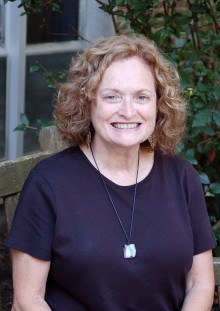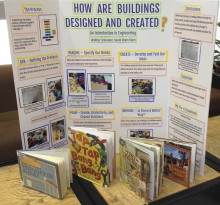Advocating for early exploration
Five years ago, in her proposal for the Dorothy Reed Williams ’43 Faculty Chair in the Social Sciences, Professor of Education Vicki Bartolini planned to develop a nationwide campaign promoting the exploration of science, technology, engineering and math, or STEM, among young children.

This fall, she spoke to policymakers in Washington, D.C. about early childhood STEM literacy—the fifth time in five years she’s done so nationally, along with three times on an international level. For the past two years she has taught local instructors in a Saturday class at Wheaton on teaching preschool STEM. And in April, Bartolini was asked to deliver the keynote speech, again on the topic of early childhood STEM, to 200 educators at the fifth annual Spring Enrichment Conference, hosted by Region 5 of the Southeast Education Professionals Partnership (SEEPP).
“When I first started working on this, nobody was talking about it at all. They were talking about the STEM pipeline and about how in the United States we don’t have that many people that are interested in STEM careers, but they weren’t looking at early childhood as a place to begin,” said Bartolini, whose Williams chair term ends this spring. “I feel very gratified. Lots of other people have come on board and done their own thing, but I feel like I’ve been a part of that and had a voice in the conversation.”
One tool that has helped illustrate the importance of STEM is a series of videos that Bartolini and her undergraduate students have made over the years at local preschools.
“What they’re doing is capturing moments of children’s play that show them exploring STEM concepts, and then we use those as teachable moments,” she said.
In one video, children play with a water table, filling and emptying containers of many sizes. Through unguided play, they explore the physical properties of liquid, measurement, estimation, volume and the effects of gravity.
The videos, along with student commentary, are posted on a website called VoiceThread, where other students and educators can view them and post audio or written commentary.
“It’s a dialogue. We’re building a collective body of knowledge from diverse perspectives on the same event by analyzing play through different lenses,” Bartolini said. “I use the videos for professional development with teachers, for other courses, for fundraising, and for policymakers to reinforce the importance of high quality play in young children’s lives.”
The videos also were shown at the SEEPP conference.
Sarah Lewis ’15, a double major in early childhood education and women’s and gender studies, created one of the STEM videos as a junior in Bartolini’s class, going to a local preschool weekly to record children at play.

“I focused on a child stacking cups, and their advanced development, which I argued went against Piaget’s theory [of cognitive development],” Lewis said. “For teachers, having this type of documentation is another way to assess the child, and truly capture the moment.”
Bartolini became interested in exploring high quality play after she studied at the Loris Malaguzzi International Centre in Reggio Emilia, Italy several years ago. The institution is world-renowned for its early childhood programs.
“In Reggio Emilia, the teachers see themselves as strong advocates for children. They see themselves as really engaged in intellectual pursuit, not just nurturing and caring. They’re very political in their stand about the importance of their work, the programming that they do, the communication with families and how we should view children as capable and competent,” Bartolini said.
Though she has always been a big proponent of unscripted play in children, Bartolini said her experience in Italy gave her a new outlook on how educators could encourage high quality play in little ones.
“Over 70 percent of children in the United States, birth through school age, are in childcare. That’s a big change from when I grew up,” she said. “We have a huge responsibility in terms of offering high quality childcare to nurture confidence, creativity, innovation and exploration in children.”
In addition to speaking at the SEEPP conference, Bartolini brought the early childhood education professionals taking her Saturday class to the event, where they exhibited their final projects for the course. The course is offered through a partnership between Wheaton and the SEEPP to individuals seeking early childhood credentials.
